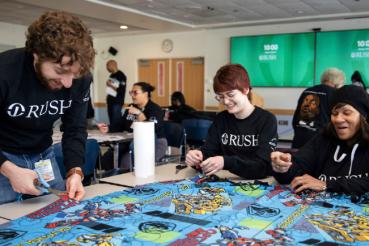Words have incredible power. As the COVID-19 pandemic spread across the globe during the last year, anti-Asian verbal and physical attacks began to grow along with it, due to damning language that placed blame for COVID-19 squarely on this population. In May 2020, the murder of George Floyd spurred many, including this institution, into action to stand against anti-Black racism. However, hate wears many faces. Anti-Asian racism is yet another manifestation of misplaced fear and hatred that needs to be rooted out and dismantled.
Since the start of the pandemic, violence against people of Asian descent in the United States steadily has increased. According to reports from the group Stop AAPI Hate, which documents and addresses anti-Asian hate and discrimination during the pandemic, the following information about hate incidents have been reported:
- From March 19 through Dec. 31, 2020, Stop AAPI Hate received more than 2,800 reports of anti-Asian hate, occurring in 47 states and the District of Columbia, with nearly 240 of those reported as physical assaults.
- States with high Asian American populations report the most incidents, including California (with 43.8% of reported incidents), New York (13%), Washington (4.1%) and Illinois (2.8%).
- Race was cited as the primary reason for discrimination, making up 90.3% of incidents.
- Common verbal assaults include harmful racist language.
This is not a new phenomenon. Similar to Black Americans, Asian Americans have faced a long history of injustices in this country, including forced internment, police brutality and structural racism enacted through policy, institutional practices and cultural misrepresentation. In health care, Asian Americans report higher rates of discrimination, and they are underrepresented in medical research.
In order to achieve our mission to improve health for all, structural racism of all kinds must be dismantled. The Racial Justice Action Committee stands with the Asian American community, and all marginalized groups, to see the advancement of our common interests: freedom from oppressive systems that perpetuate violence and threaten the health and well-being of our communities.
What can you do?
If you see or hear something that reflects anti-Asian sentiment or behavior, speak up and speak out against it. Here are five recommendations from Stop AAPI Hate on ways you can help if you witness hate:
- Take action: Approach the person who’s being affected, introduce yourself and offer support.
- Actively listen: Ask before taking any actions and respect the person's wishes. Monitor the situation if needed.
- Ignore attacker: Using your discretion, attempt to calm the situation by using your voice, body language or distractions.
- Accompany: If the situation escalates, invite the person to join you in leaving.
- Offer emotional support: Help the person by asking how they’re feeling. Assist them in figuring out what they want to do next.
These same intervention techniques can be used for racist behavior toward other groups as well. For more ways to learn how to root out hate and become anti-racist, visit the Racial Justice Action Committee Resources page.




